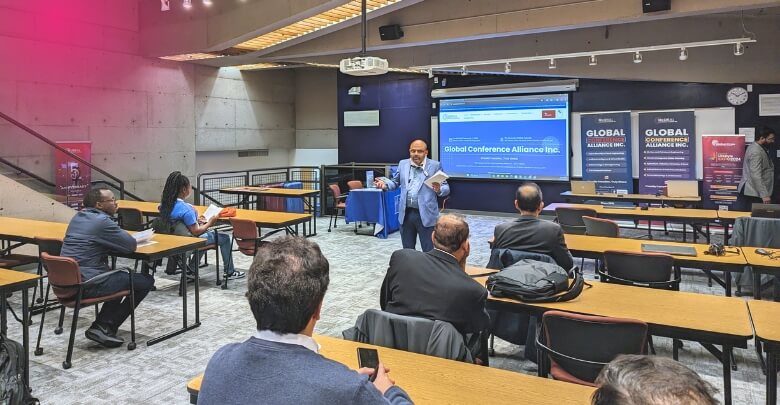A global conference serves as an important meeting point where professionals from all over the world can exchange knowledge, establish collaborations, and explore the newest technological innovations taken from around the world. Many people ask, “Why are global conferences important?”.
You can network with experts, stay up-to-date on industry trends, and improve your professional skills at global conferences. Individuals participate in these events to present their research, find career opportunities, and grow as academics and professionals. By supporting cultural exchange and showcasing innovations, they promote business and academic development.
Join us as we explore how global conferences can boost your career and expand your knowledge as we examine the many benefits they offer in today’s interconnected world.
What is a Global Conference?
A global conference is a large gathering of professionals, researchers, and industry experts from various countries. These conferences focus on diverse topics, from science to technology and business, providing attendees with knowledge-rich experiences. People attend to discuss global trends, share insights, and explore advancements in their fields. Participants benefit from the fresh perspectives and innovative ideas presented by speakers and attendees alike.

At a global conference, professionals meet others with similar interests, creating valuable connections and networking opportunities. It is important that global conference settings encourage cross-cultural collaboration, in which people can benefit from different viewpoints. Events like these encourage idea exchange, sparking discussions that impact industries on an international level. This exposure enables attendees to bring new ideas and practices back to their communities.
For researchers and practitioners, the importance of global conference participation is key to staying updated in their fields. They showcase groundbreaking research and introduce the latest tools or methods shaping various industries. Learning from industry leaders helps attendees refine their skills and broaden their understanding. Such conferences play a critical role in enhancing professional knowledge and creating lasting, impactful networks.
Objectives of Global Conference
The global conference is a vital event that brings together professionals from around the world. In collaboration, they provide a platform for knowledge exchange, networking, and advancement in the field.
- Encourage Cross-Cultural Collaboration: Participants from various cultural and geographical backgrounds are brought together at global conferences to foster cross-cultural understanding and collaboration. This diversity adds value to discussions and broadens perspectives.
- Address Global Challenges: Many conferences focus on global issues such as climate change, public health, and sustainable development. They aim to identify solutions, share successful strategies, and mobilize collective action to address these challenges.
- Recognize and Reward Excellence: Conferences often include award ceremonies that acknowledge outstanding contributions in various fields. This recognition can inspire and motivate professionals to strive for excellence and innovation.
- Stimulate Economic Growth: Hosting global conferences can boost the local economy of the host city or country. Attendees spend on accommodation, dining, transportation, and entertainment, benefiting local businesses and creating job opportunities.
- Inspire and Motivate Attendees: Hearing from thought leaders and innovators can inspire participants to pursue their goals, adopt new approaches, and strive for excellence in their work. Conferences provide a space for inspiration and renewed motivation.
The goal of global conferences is to encourage economic growth, innovation, and professional development. They create opportunities for addressing critical issues, recognizing achievements, and inspiring attendees to strive for excellence in their respective fields.
Why Are Global Conferences Important?
Global conferences play a crucial role in the professional and academic worlds, providing platforms for learning, networking, and collaboration. These gatherings bring together thought leaders and experts from various fields, allowing for the exchange of ideas on a grand scale. Here’s a closer look at why these events are so important.
Knowledge Sharing
Global conferences facilitate the sharing of cutting-edge research and innovations. Attendees gain insights into the latest trends and developments in their respective fields. This environment encourages learning from pioneers and experts, boosting the collective knowledge base.
Experts present case studies and research findings that might not be accessible through other channels. Participants leave with enhanced skills and new techniques that can be applied in their own work. This continuous learning process is vital for personal and professional growth.
Networking Opportunities
These events provide a unique venue for professionals to connect with peers from around the world. Networking at global conferences can lead to collaborations and partnerships that transcend geographical boundaries. These connections often result in joint ventures and projects.
Interacting with diverse individuals also broadens one’s professional circle and opens doors to new career opportunities. Engaging with experts from various backgrounds fosters a broader understanding and appreciation of global perspectives.
Cultural Exchange
Conferences often feature participants from a wide array of cultural backgrounds. This diversity enriches the conference experience, offering attendees a chance to learn about different cultures and practices. Such exposure promotes tolerance and understanding among professionals.
Experiencing how different cultures approach the same problems can inspire innovative solutions. This cultural exchange is a cornerstone of global conferences, enhancing social cohesion among participants.
Innovation and Collaboration
When minds from around the world come together, innovation thrives. Global conferences often spark discussions that lead to new ideas and breakthroughs. Collaborations formed at these events can change the course of research and development.
Attendees collaborate on projects that could be too large or complex for a single person or team to handle alone. These cooperative efforts often lead to significant advancements in technology and science.
Professional Development
Attending a global conference can significantly impact an individual’s career trajectory. Workshops and seminars provide professional development opportunities that are often not available locally. The skills and knowledge gained are valuable additions to one’s resume.
Such events also help attendees stay competitive in their fields, ensuring they remain relevant and capable. Professional development is a key draw for many conference-goers.
Access to Industry Leaders
Global conferences often attract industry leaders who share their experiences and insights. Attendees can interact with these leaders, gaining mentorship and advice. This direct access is invaluable for young professionals and students.
Learning directly from successful individuals provides motivation and a clearer path to achieving one’s professional goals. These interactions can be transformative for attendees at all career stages.
Cost Considerations
While attending global conferences can be expensive, the benefits often outweigh the costs associated with conferences. Budgeting for these events is an important consideration for many organizations and individuals. Strategic planning can maximize the return on investment.
Exploring various funding options, such as grants and sponsorships, can help manage these costs. Attending strategically chosen conferences ensures the most is made of both the time and money spent.
How to Attend a Global Conference?
The experience of attending a global conference can be enriching and open doors to new possibilities. To ensure a high-quality conference experience, research upcoming events and pick one organized by a reputable conference organizer. Follow these simple steps to ensure a successful and rewarding conference.
Step 1. Research Upcoming Conferences
Start by researching conferences in your field. Look for events that feature keynote speakers, workshops, or sessions aligned with your goals. Check the conference website for dates, locations, and registration details.
Step 2. Register for the Conference
Once you find a suitable conference, complete the registration process. This often involves filling out an online form and paying a registration fee. Be sure to register early to secure your spot and take advantage of early-bird discounts.
Step 3. Plan Your Travel and Accommodation
Organize your travel arrangements and book accommodation well in advance. Consider factors like proximity to the conference venue, transportation options, and your budget. Make reservations as soon as possible to avoid last-minute issues.
Step 4. Prepare Your Conference Materials
Gather any materials you’ll need for the conference, such as business cards, a notepad, and a digital or printed copy of your schedule. Review the conference agenda to identify sessions or speakers you want to attend.
Step 5. Engage in Networking Opportunities
During the conference, benefit from networking opportunities. Attend social events, participate in discussions, and connect with other attendees. Building relationships can lead to future collaborations and professional growth.
Step 6. Attend Sessions and Take Notes
Be sure to attend the sessions and workshops that interest you. Take notes on key insights, ideas, and any follow-up actions you might want to pursue. Engaging actively in these sessions will maximize your conference experience.
Step 7. Follow Up After the Conference
After the conference, follow up with the contacts you made and review your notes. Reach out to new connections via email or social media to continue conversations. Reflect on what you learned and how you can apply it to your work.
With thoughtful preparation and clear goals, attending a global conference can be truly transformative. By ensuring you attend conference for professional development, you’ll open doors to valuable learning and networking experiences. Embrace the journey and enjoy the growth opportunities each conference experience offers along the way!
What to Wear at a Global Conference?
At a global conference, it’s important to balance professionalism, comfort, and cultural sensitivity. To help you choose the perfect outfit, here’s a comprehensive guide:
1. Understand the Dress Code:
Check the conference’s dress code guidelines for both male and female outfits for the conference to dress appropriately and professionally.
- Business Formal: Suits, blazers, dress shirts, and dress shoes. Men typically wear suits and ties, while women wear suits, dresses, or professional separates.
- Business Casual: Slacks or skirts with a collared shirt or blouse. For men, this might mean dress pants and a button-up shirt, while women might wear a blouse with slacks or a professional dress.
- Smart casual: More relaxed but still polished. Think dressy jeans or chinos with a casual shirt or blouse. A blazer can elevate this look if needed.
2. Consider the Conference Location and Climate:
If you are attending an indoor event, wear light layers that can be removed if it becomes too hot. Check the weather forecast a few days in advance.
- Indoor conferences: Choose layers. A blazer or jacket might be necessary in air-conditioned rooms, but you can remove it if it gets too warm.
- Outdoor Conferences: Check the weather forecast. Dress in layers and choose comfortable, weather-appropriate clothing.
4. Cultural Sensitivity:
Be aware of cultural differences and strive to be respectful of local customs.
- Research local customs: Some regions may have specific dress norms or expectations. It’s important to respect local cultures, so research what’s considered appropriate attire in the conference’s host country.
- Professional appearance: Even if the dress code is relaxed, ensure your clothing is neat and professional.
5. Prepare for Different Environments:
Wear slacks or a skirt and a button-down shirt for an office meeting, and slacks and a casual shirt for a casual lunch. Here are some tips:
- Sessions and Workshops: Business casual or smart casual attire works well here.
- Networking Events: A slightly more formal outfit might be appreciated, such as business casual or business formal.
- Social Events: You might have more flexibility, but aim for smart casual attire unless otherwise specified.
6. Essential Items to Pack:
As you are attending an international conference, the situation might change at any moment. To deal with this situation, you should bring:
- Blazer or Jacket: A blazer or jacket is necessary for formal sessions or cooler weather.
- Comfortable shoes: For long conference days spent walking and standing, comfortable shoes are essential.
- Accessories: The right accessories can add style and versatility to your conference outfits, such as a professional bag and statement jewelry.
- Business Cards: When networking at conferences, business cards provide a convenient way to exchange contact information.
If you choose the right outfit for your conference setting, you will feel confident and make the most of your experience.
FAQs about Why Are Global Conferences Important?
A global conference can be an exciting opportunity for developing your career. Here are some frequently asked questions and their answers to help you make the most of this opportunity.
What Challenges Do Attendees Face at Global Conferences?
A language barrier, cultural differences, jet lag, and overwhelm are commonly encountered difficulties among attendees. Additionally, many attendees may not have the opportunity to network or build connections, making it difficult to generate leads or close deals. Finally, many attendees may not have access to the necessary resources or information about products.
How Can I Effectively Manage My Time During a Global Conference to Balance Attending Sessions and Exploring the City?
You should plan which sessions are most relevant to your goals and prioritize them accordingly. If you’re attending for the first time, take the time to explore the city and walk around. As a final point, take a break when you need to and be mindful of your energy levels.
What Should I Include in My Conference Travel Checklist?
Make sure to pack all the necessary items you may need during the trip, such as your laptop, phone charger, and any documents you may need. Research the area and plan for any unexpected delays. Finally, don’t forget to have fun and don’t forget to relax!
What Are the Benefits of Volunteering at a Global Conference?
It is an excellent opportunity to meet industry leaders, gain insight into the event, and build your resume by volunteering at a global conference. A volunteer’s contribution to the conference can be valuable, as they receive free or discounted admission and make valuable connections.
What Are the Best Practices for Making a Memorable Impression During Networking at a Global Conference?
When meeting potential contacts, focus on making meaningful connections. Be respectful of their language and culture, and take the time to get to know them. Finally, be sure to follow up with them after the conference.
Final Word
Global conferences are vital for professional and personal growth. By providing a platform for networking, knowledge exchange, and exposure to new ideas, they advance various fields.
Your question was, “Why are global conferences important?”. These events offer outstanding opportunities for career advancement, collaboration, and cultural exchange. They help you stay updated with industry trends, meet experts, and explore new opportunities.
A global conference can be a valuable tool for connecting with others and advancing your field. Take advantage of the conference experience in order to inspire and elevate your professional journey, so dive into it and let it inspire you!







